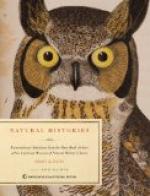[Illustration: LONG-EARED BAT.]
It is unnecessary to say that the creatures which display all this activity and intelligence are well endowed with at least all the senses possessed by the other animals of their class. The organs of smell and hearing are well developed, and in many cases associated with external membranous expansions of great size, as seen in the ears of the Long-eared Bat; and the eyes, though generally of small size except in the Fruit Bats, are bright and efficient, serving the creatures in good stead in the rapid pursuit of their insect-prey, which must be directed principally by sight. The common expression “as blind as a Bat,” must be taken to apply to Bats accidentally driven from their retreats in the day-time, when it must be confessed that they fly about in a dazed manner; but at night and in their dark retreats they show no such imbecility of purpose, but find their way with astonishing precision and certainty. In fact, instead of being blind, the Bats must be especially sharp-sighted, if all their evolutions be guided by the sense of sight, for in many cases they habitually resort to the inmost recesses of caverns and other places where, so far as our judgment goes, no light can possibly penetrate. Hence it was long since suspected that some other sense than that of sight must come to their aid when they plunge into such outer darkness as prevails in some places through which they fly with the greatest freedom, and more than a century ago numerous experiment were made by a distinguished Italian naturalist, the Abbe Spallanzani, in order to discover, if possible, what might be the secret of these curious phenomena.
He set free, in a long passage which was bent at a right angle about the middle of its length, a blinded Bat, which flew through the whole of this passage, turning the corner correctly, without anywhere touching the walls; while flying, too, it in some mysterious manner detected a hole in the roof at a distance of eighteen inches, and proceeded at once to ensconce itself in this shelter. In another experiment the Abbe took two Bats, one blinded, the other not, and placed them in a space shut off from a garden and roofed in with nets, and with sixteen strings suspended from the top in different parts. Both Bats flew about briskly and avoided the hanging strings equally well, until at length the blinded Bat discovered that the meshes of the net were large enough for him to get through, when he at once made his escape, and after flying about for a short time, went off directly to the only roof in the vicinity, under which he disappeared. In short, from these experiments it became perfectly clear that under these circumstances the sense of sight was not of primary importance in guiding the course of the Bat. Similar trials with the organs of smell and hearing showed that they had nothing to do with it, and the only other sense that could be appealed to was the general sense of touch.




